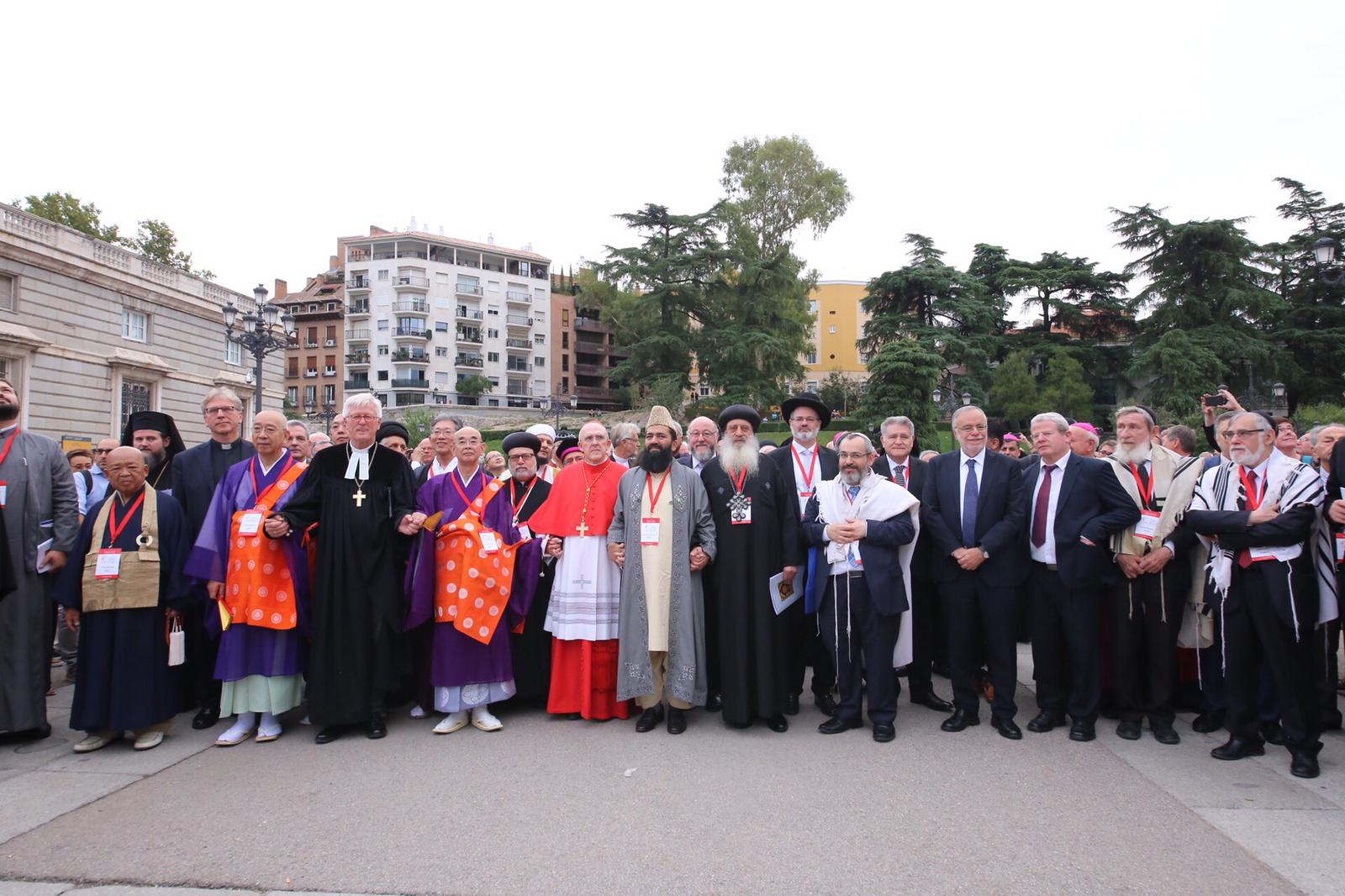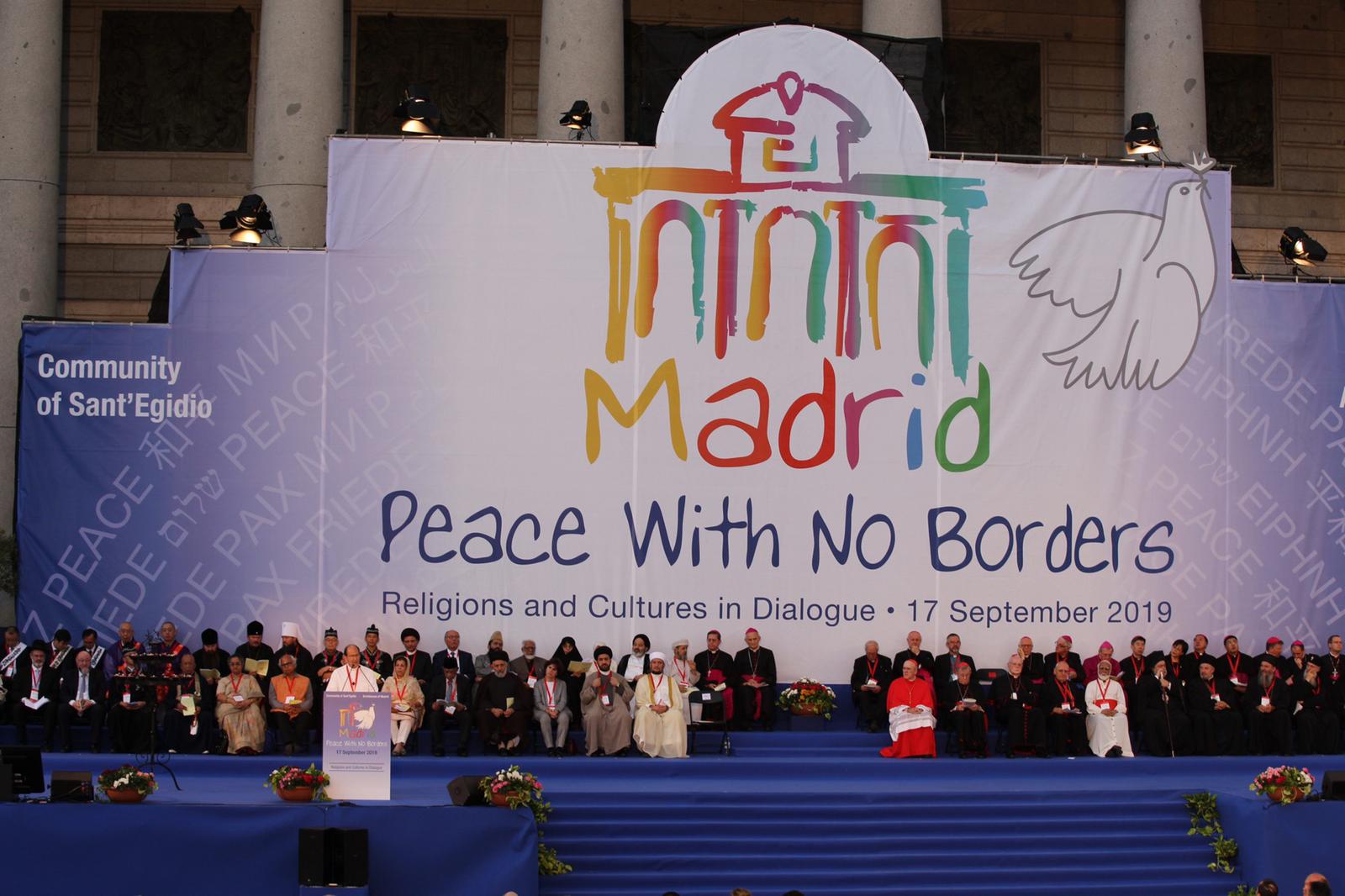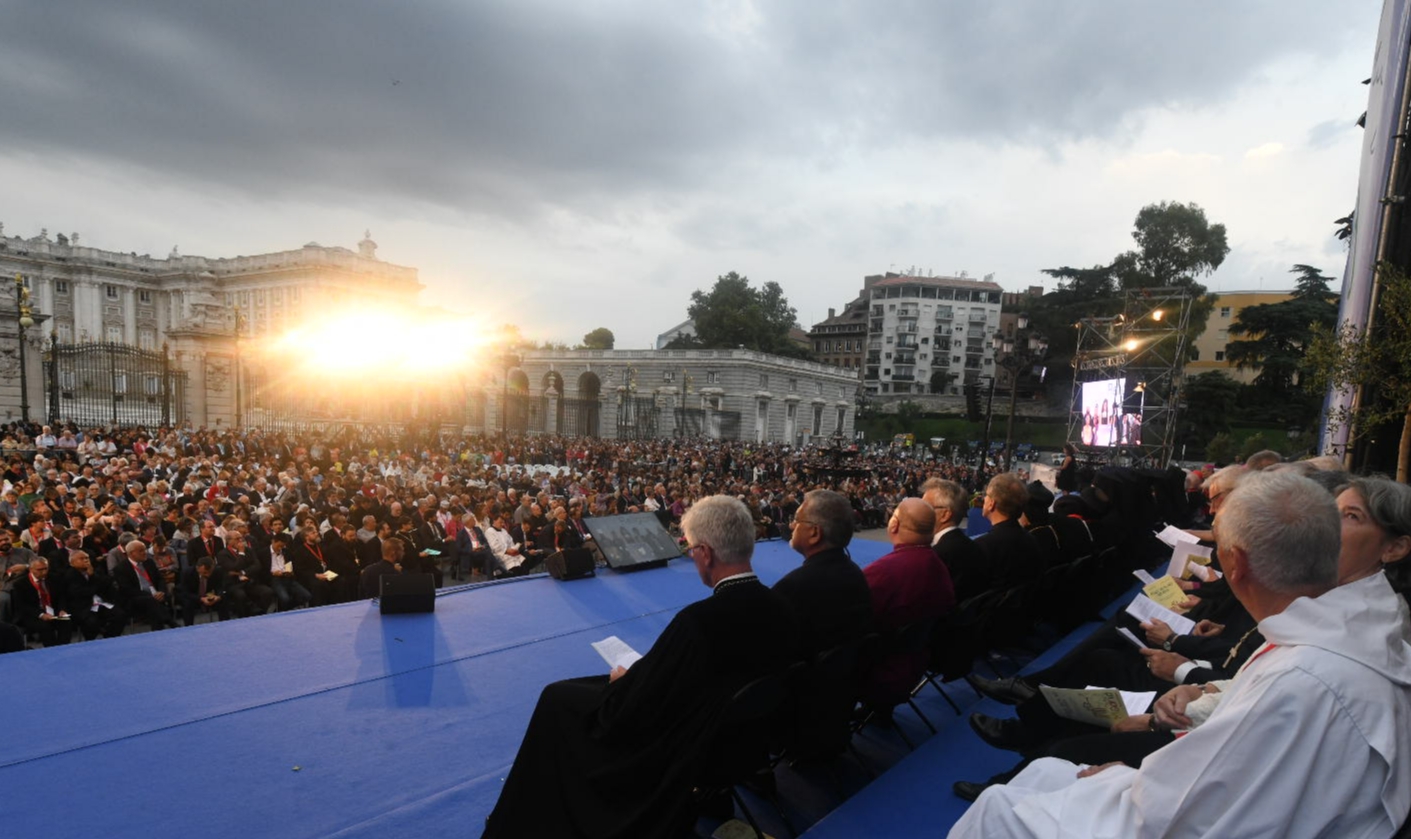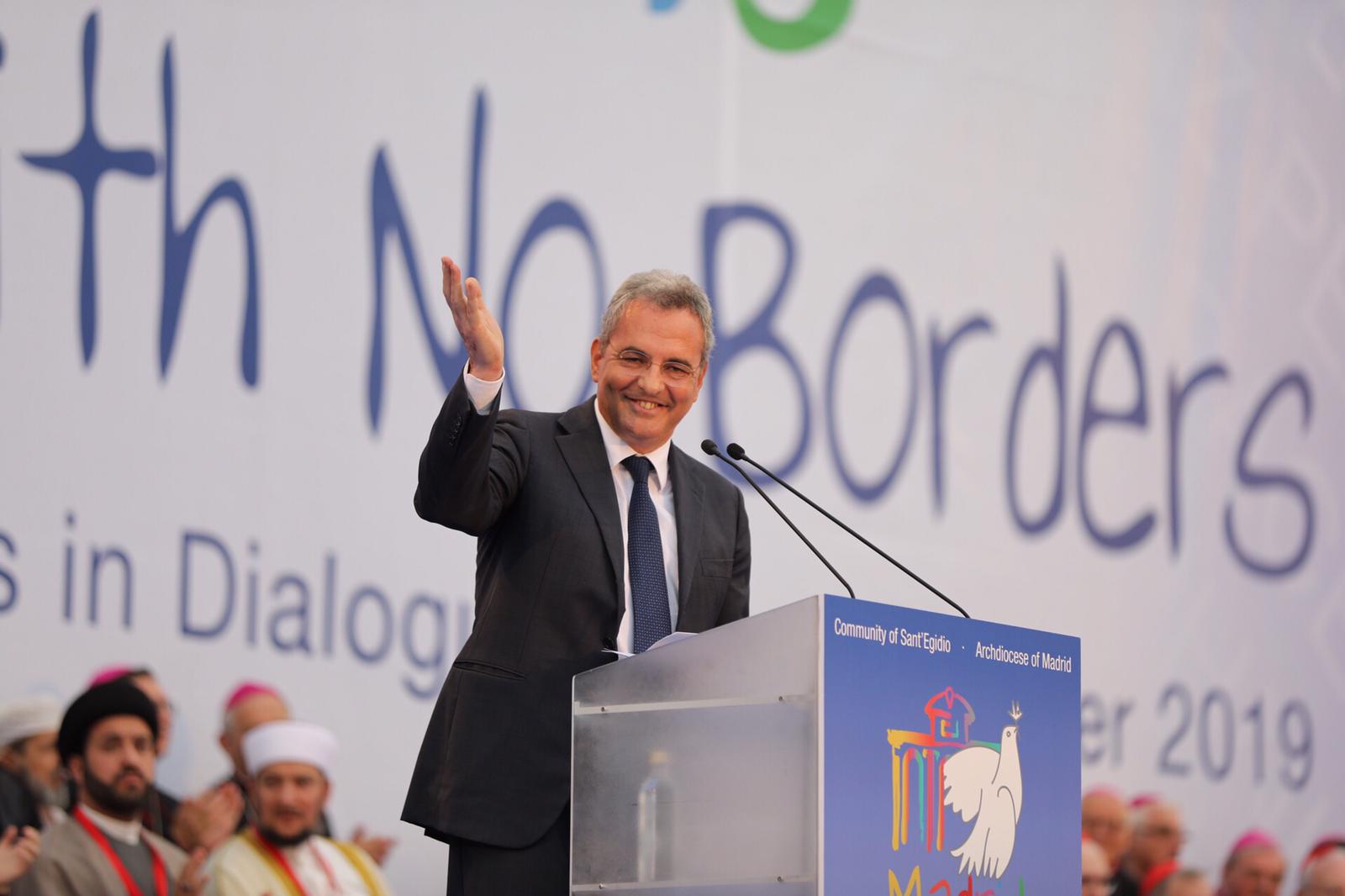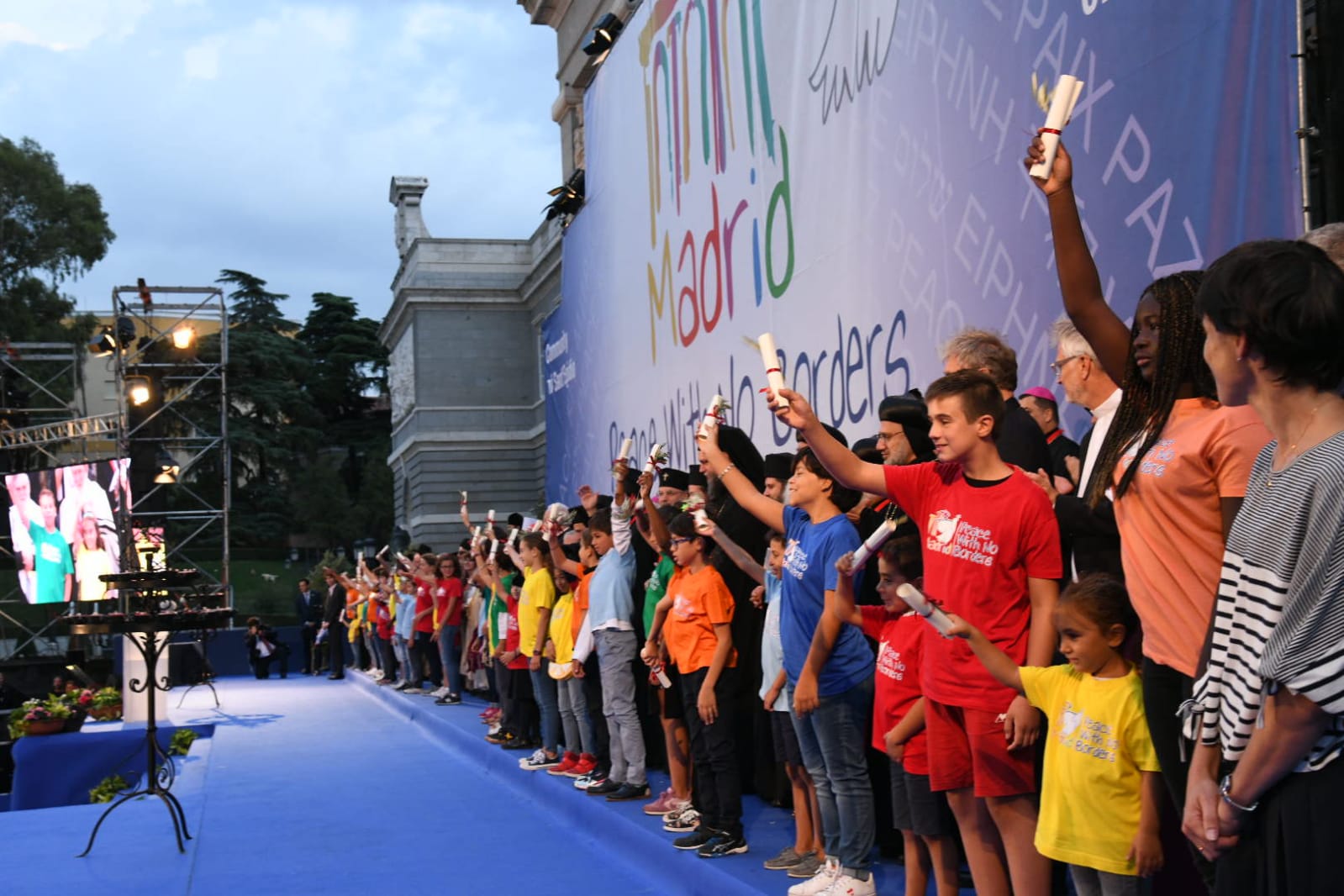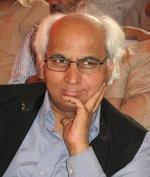
Each year, when the Community of Sant’Egidio brings us all together for this conference in some European city or the other, it selects a broad theme for its meeting.
This year, in Madrid, it is ‘PEACE WITHOUT BORDERS’.
Last year in Bologna, it was ‘BRIDGES OF PEACE’.
A year before that, in Münster and Osnabrück in Germany, it was ‘PATHS OF PEACE’.
Just the words change. But the underlying idea, intent and focus are the same.
No one can accuse the organisers of being repetitious.
Rather, one can say the Community of Sant’Egidio is tenacious.
It is so unwaveringly and implacably focused on its core idea, its raison d’etre, that it just does not tire, nor retire.
And that core idea, that self-given mandate, is PEACE and FRATERNITY all over our beautiful planet.
Of course, our idea and the ideal do not become a reality as per our plan or desire.
Human history has its own dynamics of change.
But that does not make our endeavour the fruitless endeavour of Sisyphus.
The hopeless and meaningless task of the absurd hero Albert Camus describes in his book ‘The Myth of Sisyphus’.
The mission of peacemakers is bound to bear fruit, if our intention is pure, if our efforts are not weak and inconsistent, if our resolve does not slacken, and if we do not lose hope.
As a matter of fact, history gives ample proof of success of the efforts of peacemakers belonging to previous generations.
For example, the considerable degree of peace, progress and international cooperation that we have seen in the past 75 years after the end of the Second World War was not achieved accidentally.
It was the outcome of the enormous struggles and heroic campaigns by countless peace-loving organisations and individuals around the world, especially in Europe.
If we take a telescopic view of history, human race has come a long, long way from the time when our forebears were hunter-gatherers.
Human history is not a history of stagnation, much less of regression.
Human history is a history of progression – in culture and arts, in material wellbeing, in science and technology, in other explorations of the intellect, in philosophy and spirituality.
Therefore, let us never become cynical; let us never lose hope; let us never weaken our efforts to create a world without wars and violence.
Friends,
It is with this preface that I approach the theme of this conference, ‘PEACE WITHOUT BORDERS’, and the theme of this session, ‘HUMAN FRATERNITY’.
We must, first of all, reaffirm some first principles.
Peace is not a destination. Peace is the journey itself.
Moreover, peace is indivisible not only temporally; peace is also indivisible spatially.
We cannot believe or pretend that there can be peace in some parts of the world, when other parts of the world are in violent conflict.
Humanity is a single body corporate, it is one integral living body, one indivisible Global Human Family. Therefore, some parts of that body cannot enjoy absolute tranquillity and happiness when others are in pain.
This is the meaning of ‘PEACE WITHOUT BORDERS’.
The key word here is ‘Borders’.
We have allowed Nationalism, Colour, Class, Caste, Language, Race, even Religion to become borders dividing the human family.
Our world must learn to convert borders and barriers that divide mankind, into bridges that connect its diverse identities.
Identities cannot be obliterated. Identities are the signatures of the diversity that is intrinsic to the design and architecture of humankind.
But why should identities become adversaries, and not friends mutually inviting to discover and share each other’s gifts?
History reminds us that peace has arrived whenever communities have discovered the even more fundamental Unity of the Human Family that transcends and ties all its Diversities.
This brings me to theme of this session: HUMAN FRATERNITY.
The word ‘Fraternity’ has many meanings – Society, Community, Brotherhood, Group…and so on.
But in each of its meanings, Fraternity conveys a bond of oneness, of unity…Moreover, unity with a purpose.
The purpose of Fraternity is to leave no room for conflict, and to always create more room for peace, mutual understanding and harmony.
Human Fraternity rejects the notion of “Us versus Others”; rather, it affirms the virtue of “Us and Others”, so that diverse identities are harmonised.
History teaches us that the mindset of “Us versus Others” can only lead to prejudice, friction, conflict, violence and destruction; whereas the mindset of “Us and Others” invariably reduces differences, thereby producing cooperation, peace, progress, prosperity and happiness for all.
Ramana Maharshi (1879-1950), one of India’s greatest saints in the modern era, drove this lesson home compellingly. He was once asked: “How should we treat others?” Ramana Maharshi replied: “There are no others.”
Friends,
What are the practical ways in which we can strengthen the bonds of Human Fraternity in the times we live in?
The answer to this question requires us to understand the forces that promote Human Fraternity and the forces that are doggedly opposing it.
Two contrary and conflicting processes are at work in the 21st century.
On the one hand, digital technologies have knit the world into a Global Village, which is more inter-connected and more inter-dependent than ever before in human history.
Peoples of various countries, continents, cultures and communities based on religion, race, ethnicity and language are interacting with one another like never before in human history.
Every day, every hour, every minute, millions of people in all corners of the globe are conversing and communicating with one other.
Human mobility has now become planet-wide.
This physical and digital connectivity, which we call globalisation, is an altogether new and hopeful stage in the evolution of the human species.
We should further strengthen this phenomenon of globalisation in order to strengthen Human Fraternity.
On the other hand, opposing this phenomenon of unity and fraternity, are false and divisive interpretations and understandings of identities, which, in extreme cases, look at “Others” as “Enemies”.
Such misinterpretations of identities obsessively cling to the myth that one’s own interests and wellbeing cannot be secured through cooperation with “Others”.
I shall deal with two such divisive misinterpretations – one concerning nationalism and nation-states, and the other concerning religion.
In recent centuries, nothing has been a source of more tension, more conflict, and more wars than the wrong notions of nationalism.
Wrong assertions of nationalism have indeed proved to be more dangerous than wrong notions of religion.
National sovereignty as exercised by nation-states is challenging and undermining human fraternity and solidarity.
Right now, for example, we are seeing the most brazen misuse of the notion of national sovereignty in Brazil, where the ruling government is claiming that Brazil’s need for more land for mining and industries overrides the global community’s need for Amazon rainforest.
But Brazil is by no means the sole culprit when it comes to endangering humankind’s survival by making false and self-serving claims of national sovereignty.
What about all those nations, including my own country India, that have armed themselves with nuclear weapons and missile systems?
These nations claim they have a sovereign right to build these weapons for their national security, even though these weapons of mass destruction directly threaten the security of all other nations, and indeed the survival of the entire human race?
Therefore, all those who are wedded to the ideal of ‘PEACE WITHOUT BORDERS’ must strengthen our demand a million fold for the complete, irreversible and universal elimination of all nuclear weapons and other weapons of mass destruction.
Also, in the age of globalisation, it has become absolutely necessary to demand that the sovereignty of nations be limited for the sake of human fraternity, human security and sustainable human development.
Don’t we limit the rights and freedoms of individuals for the larger good of the community and the nation?
Similarly, why can’t the sovereignty of nations be limited and made subservient to the larger good of the Human Family?
Therefore, the realities and needs of the 21st Century demand that we reimagine the concept of nations and nation-states in such a way that they become mutually complementary, cooperative and respectful.
Specifically, we should intensify the campaign for making the principles and institutions of Global Governance effective, fair and beneficial to all.
The United Nations Organisation must be strengthened with suitable reforms. It should be so empowered as to be able to resolve disputes among nations.
Friends,
As far as religion is concerned, it is most ironical that religion should have become a force antithetical to Human Fraternity.
The very meaning and purpose of religion – indeed, all religions in the world – is to proclaim the oneness of Human Family with a common Creator: God.
Religions differ from one another only in their modes of worship, prayer and other externalities. In their essence, they are but various convergent paths leading to the same goal.
Sadly, when externalities of religion marginalise its essence, and when smaller identities overshadow our common identity as human beings, religion becomes an agent of division and discord.
A greater danger to Human Fraternity arises when followers of a particular religion claim that their religion alone is true and others are false, or that theirs is superior and others are inferior.
When such extremist misinterpretations gain currency, they become coercive, aggressive and violent.
The danger to peace becomes all the greater when extremist religious frenzy fuels terrorism, and even justifies it in the name of God.
Therefore, all of us who wish to strengthen Human Fraternity must redouble our efforts to spread the true meaning and message of all religions through mutually respectful inter-faith, inter-cultural and inter-national dialogue and active cooperation.
Friends,
Our vision of Human Fraternity is one in which every individual and every community can live a life of freedom, justice and dignity, without fear, insecurity or deprivation; helping but never harming the other; proud of one’s own identity but always respectful of others in the Global Human Family.
Permit to end my remarks by reciting a short prayer, which best articulates this vision of Human Fraternity. It is actually a poem by Rabindranath Tagore, India’s national poet and the first Asian to win the Nobel Prize for Literature. It is titled:
Where The Mind Is Without Fear
Where the mind is without fear and the head is held high
Where knowledge is free
Where the world has not been broken up into fragments
By narrow domestic walls
Where words come out from the depth of truth
Where tireless striving stretches its arms towards perfection
Where the clear stream of reason has not lost its way
Into the dreary desert sand of dead habit
Where the mind is led forward by thee
Into ever-widening thought and action
Into that heaven of freedom, my Father, let my country WORLD awake.
Thank you.
